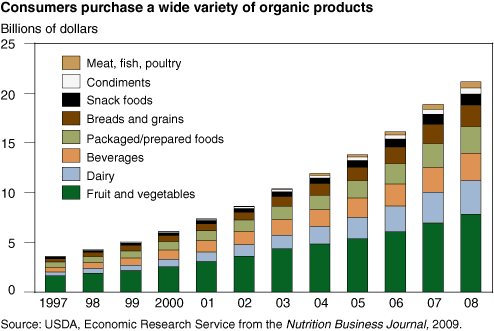Expanding Demand for Organic Foods Brings Changes in Marketing
- by Carolyn Dimitri and Lydia Oberholtzer
- 3/1/2010
The past decade has seen major changes in organic product retailing. In the late 1990s, the natural products channel—independent and small-chain natural products stores, food cooperatives, and large natural products retailers, such as Whole Foods—was the primary outlet for organic food. By 2006, approximately half of all organic food was sold through the conventional channel, which includes such stores as Safeway and Costco.
The types of products that consumers purchase have also changed. Although organic fruit and vegetables have been the top-selling organic products since 1997, consumers have started purchasing a wider range of other organic foods. By 2008, nonproduce items, such as dairy, beverages, packaged and prepared foods, snack foods, and bread and grains, accounted for 63 percent of consumer spending for organic food products, up from 54 percent in 1997.
Both the number and type of new products reflect the expanding consumer appetite for organic foods. In 2007, 1,107 organic products were introduced, with beverages accounting for 251 of the total; snack foods, 211; and prepared or packaged foods, 167. Traditional marketing strategies for organic foods, including organic versions of conventional brands (such as organic Heinz ketchup), have accompanied the growing organic sales in conventional channels.
The recent burgeoning of organic private-label products also has contributed significantly to increased organic sales. In 2000, few organic private labels existed—with the exception of Whole Foods’ 365 Organic, which has been available since the mid-1990s. Now, almost every large conventional supermarket sells private label organic products, many of which were introduced after the 2002 promulgation of organic standards.
The share of organic foods sold in the U.S. under private labels more than doubled between 2003 and 2008 to an estimated 17.4 percent. Organic private label product introductions expanded from 35 in 2003 to 540 in 2007. According to 2007 ERS data, approximately 43 percent of certified organic handlers manufactured private label products, which made up approximately 19 percent of their organic sales.
This article is drawn from:
- Dimitri, C. & Oberholtzer, L. (2009). Marketing U.S. Organic Foods: Recent Trends From Farms to Consumers. U.S. Department of Agriculture, Economic Research Service. EIB-58.


